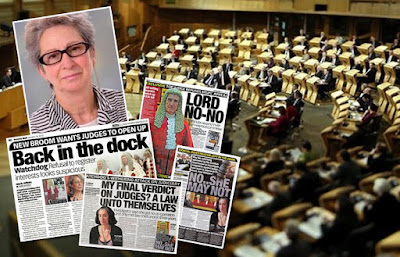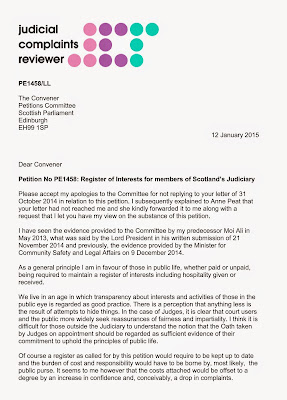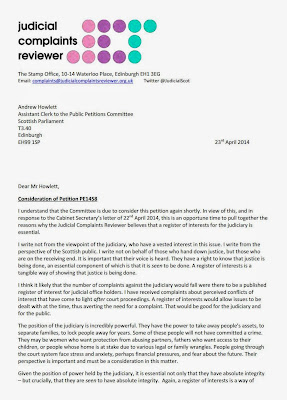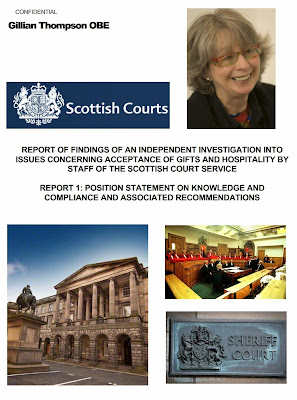 New Judicial Complaints Reviewer to face Holyrood. SCOTLAND’S new Judicial Complaints Reviewer (JCR) will appear before the Scottish Parliament’s Public Petitions Committee tomorrow, Tuesday 23 June, to give evidence on her support for a register of judicial interests.
New Judicial Complaints Reviewer to face Holyrood. SCOTLAND’S new Judicial Complaints Reviewer (JCR) will appear before the Scottish Parliament’s Public Petitions Committee tomorrow, Tuesday 23 June, to give evidence on her support for a register of judicial interests.
Gillian Thompson OBE – former head of the Accountant in Bankruptcy (AIB) who has held the post of JCR since summer 2014 – replacing Moi Ali - Scotland’s first ever Judicial Complaints Reviewer who stood down last year due to a lack of regulatory power - is expected to continue support for a proposal calling for judges to be required to declare their vast wealth and secretive links to business, as called for in Petition PE1458: Register of Interests for members of Scotland's judiciary.
The judicial transparency proposal calls for the creation of a single independently regulated register of interests containing information on judges backgrounds, their personal wealth, undeclared earnings, business & family connections inside & outside of the legal profession, offshore investments, hospitality, details on recusals and other information routinely lodged in registers of interest across all walks of public life in the UK and around the world.
The petition has cross party support from MSPs who backed a motion urging the Scottish Government to create a register of judicial interests at Holyrood on 7 October 2014 - reported along with video footage and the official record, here: Debating the Judges.
Writing in a letter to the Public Petitions Committee in January, Judicial Complaints Reviewer Gillian Thompson backed calls to make judges more accountable on their secretive interests.
 Gillian Thompson told MSPs: “As a general principle I am in favour of those in public life, whether paid or unpaid, being required to maintain a register of interests including hospitality given or received.”
Gillian Thompson told MSPs: “As a general principle I am in favour of those in public life, whether paid or unpaid, being required to maintain a register of interests including hospitality given or received.”
“We live in an age in which transparency about interests and activities of those in the public eye is regarded as good practice. There is a perception that anything less is the result of attempts to hide things. In the case of Judges, it is clear that court users and the public more widely seek reassurances of fairness and impartiality. I think it is difficult for those outside the Judiciary to understand the notion that the Oath taken by Judges on appointment should be regarded as sufficient evidence of their commitment to uphold the principles of public life.”
“Of course a register as called for by this petition would require to be kept up to date and the burden of cost and responsibility would have to be borne by, most likely, the public purse. It seems to me however that the costs attached would be offset to a degree by an increase in confidence and, conceivably, a drop in complaints.”
JCR Gillian Thompson’s backing for Petition PE1458: Register of Interests for members of Scotland's judiciary comes after Moi Ali - Scotland’s first ever Judicial Complaints Reviewer – quit her role as JCR after describing the job as “window dressing” during an evidence session with MSPs in September 2013, reported along with video coverage here: As Scotland’s top judge battles on against transparency, Judicial Complaints Reviewer tells MSPs judges should register their interests like others in public life
JCR Moi Ali gives evidence to Scottish Parliament on a proposed Register of Judicial Interests
The full written report on the eye opening 2013 evidence session with Moi Ali and the Scottish Parliament’s Public Petitions Committee was published here : Evidence from Scotland’s Judicial Complaints Reviewer Moi Ali to Public Petitions Committee on Petition 1458 Register of Interests for Scotland’s Judiciary
 Judicial Complaints Reviewer Moi Ali backed register of judicial interests: A further letter of support from Moi Ali while she held the post of Judicial Complaints Reviewer told MSPs of the “incredibly powerful” nature of the judiciary and why a register of judicial interests would help judicial transparency and public confidence in the justice system.
Judicial Complaints Reviewer Moi Ali backed register of judicial interests: A further letter of support from Moi Ali while she held the post of Judicial Complaints Reviewer told MSPs of the “incredibly powerful” nature of the judiciary and why a register of judicial interests would help judicial transparency and public confidence in the justice system.
Moi Ali said: “I write not from the viewpoint of the judiciary, who have a vested interest in this issue. I write from the perspective of the Scottish public. I write not on behalf of those who hand down justice, but those who are on the receiving end. It is important that their voice is heard. They have a right to know that justice is being done, an essential component of which is that it is seen to be done. A register of interests is a tangible way of showing that justice is being done.”
“I think it likely that the number of complaints against the judiciary would fall were there to be a published register of interest for judicial office holders. I have received complaints about perceived conflicts of interest that have come to light after court proceedings. A register of interests would allow issues to be dealt with at the time, thus averting the need for a complaint. That would be good for the judiciary and for the public.”
“The position of the judiciary is incredibly powerful. They have the power to take away people’s assets, to separate families, to lock people away for years. Some of these people will not have committed a crime. They may be women who want protection from abusing partners, fathers who want access to their children, or people whose home is at stake due to various legal or family wrangles. People going through the court system face stress and anxiety, perhaps financial pressures, and fear about the future. Their perspective is important and must be a consideration in this matter.”
“Given the position of power held by the judiciary, it is essential not only that they have absolute integrity but crucially, that they are seen to have absolute integrity. Again, a register of interests is a way of demonstrating that a judicial office holder is impartial and has no vested interest in a case –financially, through family connections, club/society membership or in any other way. Conversely, the refusal to institute a register of interests creates suspicion that in turn undermines judicial credibility. So once more, a register of interests is good for the judiciary and good for the public.”
Gillian Thompson’s appearance before MSPs at Holyrood follows a secret meeting between Scottish Ministers and Lord President Lord Gill - who demanded proposals on requiring judges to declare their interests - be halted.
The secret meeting between Legal Affairs Minister Paul Wheelhouse and Scotland's now retired top judge Lord President Lord Brian Gill (73) and his aides was held in February - to discuss joint efforts between the Scottish Government and senior judicial figures to combat a long running Scottish Parliament investigation into proposals to increase transparency of the judiciary - Petition PE1458: Register of Interests for members of Scotland's judiciary.
The existence of the secret get together between Scottish Government Ministers and judges desperate to conceal their vast and varied interests from the public - only came to light in a letter of intervention from Scotland’s First Minister Nicola Sturgeon to the Scottish Parliament’s Public Petitions Committee at the end of March.
NEW JCR SCRUTINISED REGISTERS OF INTEREST FOR COURT STAFF:
Diary of Injustice previously reported on concerns regarding hospitality involving Scottish Court Service employees where the former AIB Chief was asked by the Scottish Court Service to investigate reports of irregularities in hospitality given to court staff. The request for the investigation came after the SCS received Freedom of Information requests regarding hospitality in the courts, prompting concerns some staff may have accepted gifts or hospitality but failed to register.
 Report said SCS Registers were insufficient, and Court staff involved in private gain failed to declare. Gillian Thompson’s Report on Hospitality & Gifts in the SCS stated: “The information currently captured on the registers is insufficient to provide assurance that staff are using their common sense and considering issues such as conflict of interest.
Report said SCS Registers were insufficient, and Court staff involved in private gain failed to declare. Gillian Thompson’s Report on Hospitality & Gifts in the SCS stated: “The information currently captured on the registers is insufficient to provide assurance that staff are using their common sense and considering issues such as conflict of interest.
Ms Thompson went on to recommend the “SCS should revise the Policy on Acceptance of Gifts, Rewards and Hospitality to ensure that it is fit for purpose for all staff, taking account of the various roles performed within SCS. It may also be time to revisit the levels of value for gifts and hospitality.”
The former AIB’s report also revealed court staff were using their positions to earn money privately from their links with lawyers and law firms operating in courts, stating “Several staff raised the issue of sheriff clerks who carry out extrajudicial taxations and private assessments and who personally benefit financially from these activities.”
Ms Thompson’s report roundly condemned this practice, stating: “Not only is it inappropriate in terms of the civil service code requirements for staff who are public servants to be able to receive private gain from their employment it is also highly divisive when other staff see such benefits being derived from simply being in the right post of Auditor of Court within the Sheriff Courts.”
Ms Thompson recommended in her report the “SCS should bring the practice of sheriff clerks profiting privately from their employment by SCS to an end as quickly as possible”.
Previous articles on the lack of transparency within Scotland’s judiciary, investigations by Diary of Injustice including reports from the media, and video footage of debates at the Scottish Parliament’s Public Petitions Committee can be found here : A Register of Interests for Scotland's Judiciary
25 comments:
So,no chance of her going back on her word then? or you know how it will look..
Oh must keep a watch on this one!
Moi Ali in the video clip you posted did very well.First time I have ever heard someone give the truth about judges not the usual spiel we are used to from those at the top!
seems you have it well covered
why is Nicola Sturgeon trying to block this when we should be making it law?
Take the "cost burden" of this register out of the £30million you previously reported the Scottish Government spend each year on the judges.
If Scotland is daft enough to blow £30m on a bunch of judges out to cover up their dodgy finances we can surely afford to register same dodgy finances and let everybody find out what Lord Gill knows is so secret it must not be talked about!
I will be watching tomorrow, as I am sure will many others. It will be a decisive factor in who I vote for in future.
Gillian Thompson OBE
Retired Public Sector Chief Executive
36 years experience in delivering the policies of the Scottish Government including development of devolved and reserved policies, leading legislative change, project and programme management, corporate and financial accountability, operational and organisational change, delivery of services to consumers.
As Chief Executive of Scotland’s insolvency service from 2002-2009, reduced the overall cost of administering the bankruptcy regime, year on year, whilst providing new and improved services to customers.
Same GT?
Could be interesting tomorrow
just finished watching the video of Moi Ali speaking with the msps and want to say this is the best ever thing I have watched about justice and legal subjects.
and for your blog and how you put all the information together.Well done.
“The position of the judiciary is incredibly powerful. They have the power to take away people’s assets, to separate families, to lock people away for years. Some of these people will not have committed a crime. They may be women who want protection from abusing partners, fathers who want access to their children, or people whose home is at stake due to various legal or family wrangles. People going through the court system face stress and anxiety, perhaps financial pressures, and fear about the future. Their perspective is important and must be a consideration in this matter.”
Yes,quite so.
This is why judges have to be scrutinised even more than anyone else.
Keep watching the windows tomorrow - there is a rumour going round Holyrood a 70 year old judge will be standing on a long ladder holding flashcards at the windows for Gillian T to read out
This could be massive!Judges could have been rigging cases for years and no one knew what their interests were or even bothered to ask until now!
I wonder if Gillian Thomson is getting two thousand pounds a year to do this job?
This is the thing that blows the judiciary right out of the water and reveals all they do not want revealed.Well done.
btw on a side note the captcha is now so difficult it is almost impossible to make a comment.
Watched it,she supports the petition so well done again now over to msps to make this law!
Watched the session, she did well - more to add on your follow up article.
is shocking judges are allowed to carry on as they do and not tell us about their interests
The report on the court staff should have resulted in sackings at least and criminal charges because the people at courts are using their jobs to make money on the side and I reckon influence court cases and outcomes for their own ends.
Any more thoughts on who will end up as Lord President after the shambles of Gill's sudden retirement?
@ 25 June 2015 at 00:35
Yes on all points ... further investigations since do appear to indicate hospitality to court staff has been used to influence justice, and competition between law firms to secure legal aid clients.
@ 25 June 2015 at 13:50
Hopefully a judge more in tune with the times, the value of transparency and one who respects the wider community & Scotland as a whole instead of closed shop vested legal & business interests ...
"Hopefully a judge more in tune with the times, the value of transparency and one who respects the wider community & Scotland as a whole instead of closed shop vested legal & business interests ..."
Would be nice to think this possible but reading your excellent blog they appear to be all the same..so I wont be holding my breath for change anytime soon.Not as long as judges are too busy keeping all their secrets and keeping an eye on the rest of us in case we find out!
What do you think about this? Is there anyone honest enough to investigate Lord Advocate and crown disclosure?
http://www.heraldscotland.com/news/home-news/legal-expert-wants-investigation-into-crowns-actions-on-disclosure.129841239
Legal expert wants investigation into Crown's actions on disclosure
A LAW expert has called for an investigation into a "culture of unwillingness" at the Crown Office amid concerns over the case of David Gilroy, convicted of murdering his former lover despite no body being found.
Professor Robert Black, QC, one of the architects of the Lockerbie trial, said potential disclosure issues in high profile cases are a public concern and families and legal teams should not have to launch lengthy and costly court actions to access information that could be relevant to their case.
The family of Gilroy, three years into an 18-year life sentence for the murder of his Edinburgh bookkeeper colleague Suzanne Pilley, who was 38, are trying to clear the 52-year-old who was convicted without witness or forensic evidence five years ago.
They are challenging the Crown Office over the disclosure of information including CCTV footage from various locations which they say would give answers that would either prove or disprove their case.
In 2012 a damning SCCRC dossier over the handling of evidence in the Lockerbie bombing trial found the Crown failed to disclose seven key items of evidence and that had such information been shared with the defence, the result of the trial of Abdelbaset Ali Mohmed al Megrahi could have been different.
Mr Black, who prepared a live case for the commission for relatives of victims, said it was of concern the Gilroy case raised issues of disclosure practices and non-disclosure of evidence.
He said: "These are two of the items founded upon in the current Megrahi application and indeed were among the grounds of referral accepted by the SCCRC in its 2007 report on the Megrahi case.
"A serious question that arises and needs to be investigated is whether there was, and whether there still is, within the Crown Office a culture of unwillingness to comply with their duty of disclosure to the defence.
"This is not a matter that should be left to be raised in individual cases but should be addressed more generally, perhaps in the Justice Committee of the Scottish Parliament."
The circumstantial case was enough to convince the majority of a jury that an early morning encounter between the two had ended in married father-of-two Gilroy throttling the woman who spurned him in a jealous rage.
Prosecutors argued that he concealed her body in the basement of the offices where they worked and then the boot of his car before disposing of her remains next day somewhere in the Argyll forest.
Advocate Depute Alex Prentice QC said during his trial that when the individual strands of evidence presented were bound together they formed a cable and the strength of the case.
The Gilroy family have taken their case public because they believe so far the Scottish justice system has let them down.
His case is currently being examined by the Scottish Criminal Cases Review Commission which could lead to a new appeal being heard.
Details of the SCCRC case are confidential, but the Gilroy family have echoed broad concerns over the disclosure of evidence.
A Crown Office spokesman said that "Gilroy was sentenced to life imprisonment having been found guilty by a jury after trial".
"The Crown has a duty of disclosure throughout proceedings, which was fulfilled."
A spokesman for Police Scotland said officers could not comment as the case is subject to SCCRC review.
In Lockerbie case, three of the undisclosed documents related to payments of around $3 million (£1.9m) made by the US Justice Department to Paul and Tony Gauci - key witnesses in the Crown's case who claimed Megrahi bought clothes in his Malta shop, which were later found to be in the suitcase that contained the bomb which killed 270 in December 1988.
You probably know by now one you did no the gifts to court staff caused a right row on the legal aid accusations
The legal profession exercise control over the freedom, will of others; because they are authoritarian and want the public kept ignorant and right-less. Their self regulatory system is a form of domination which has no legitimacy in a society where we vote for people to represent us. But do they truly represent us? Did those who voted for our First Minister expect her to protect the legal profession. Ask MSP's for their intervention against the Law Society or any legal professional on your behalf and you will learn democracy is an illusion. Whether or not you have right depends on what you want an MSP to do.
Read it in the Sun yesterday,Gill will be angry about her support and the fact he is being called back to the committee
I remember a QC who haggled for a huge appearance fee on beebScotland and they had to pay it because he said he would see to it none of his colleagues ever appeared on a certain show again..
When are you covering the new jcr story?
Post a Comment